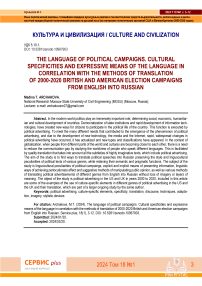The language of political campaigns. Сultural specificities and expressive means of the language in correlation with the methods of translation of 2000-2020 British and American election campaigns from English into Russian.
Автор: Archakova M.T.
Журнал: Сервис plus @servis-plus
Рубрика: Культура и цивилизация
Статья в выпуске: 1 т.18, 2024 года.
Бесплатный доступ
In the modern world politics play an immensely important role, determining social, economic, humanitarian and cultural development of countries. Democratization of state institutions and rapid development of information technologies, have created new ways for citizens to participate in the political life of the country. This function is executed by political advertising. To meet the many different needs that contributed to the emergence of the phenomenon of political advertising, and due to the development of new technology, the media and the Internet, rapid, widespread changes in political advertising have occurred, it has actualized and new types and classifications have appeared. In the context of globalization, when people from different parts of the world and cultures are becoming closer to each other, there is a need to reduce the communication gap by studying the worldview of people who speak different languages. This is facilitated by quality translation that takes into account all the subtleties of highly imaginative texts, which include political advertising. The aim of the study is to find ways to translate political speeches into Russian preserving the style and linguocultural peculiarities of political texts of various genres, while retaining their semantic and pragmatic functions. The subject of the study is linguocultural peculiarities of political campaings, explicit and implicit means of presenting information, linguistic ways of achieving perlocutionary effect and suggestive methods of manipulating public opinion, as well as various methods of translating political advertisements of different genres from English into Russian without loss of imagery or layers of meaning. The object of the study is political advertising in the US and UK in years 2000 to 2020. Included in this article are some of the examples of the use of culture-specific elements in different genres of political advertising in the US and the UK and their translation, which are part of a larger ongoing study by the same author.
Political advertising, culture-specific elements, specificity, translation, discourse, techniques, adaptation, imagery, stylistic devices
Короткий адрес: https://sciup.org/140305370
IDR: 140305370 | УДК: 5.10.1. | DOI: 10.5281/zenodo.10967903
Список литературы The language of political campaigns. Сultural specificities and expressive means of the language in correlation with the methods of translation of 2000-2020 British and American election campaigns from English into Russian.
- Kuznecov, P.A. (2015) Politicheskaya reklama. Teoriya i praktika: ucheb. Posobie [Political advertising. Theory and practice: textbook]. Moscow: “YUNITI-DANA”. (In Russ.).
- Teun, A van Dijk (2008). Discourse and Power. UK: Bloomsbury Publishing.
- Sokolova, O. V (2014). Tipologiya diskursov aktivnogo vozdejstviya: poeticheskij avangard, reklama i PR [Active Effect Discourses. Poetic avant-garde, advertising and PR]. Moscow: “Gnosis”. (In Russ.)
- Horoshkevich N.G. (2015). Social'naya i politicheskaya reklama: uchebno-metodicheskoe posobie [Social and Political Advertising: Educational and Methodological Manual]. Ekaterinburg: UrFU. (In Russ.).
- Bushev A.B. (2018). Yazykovie osobennosti reklamnogo, politicheskogo i PR-discursov [Linguistic peculiarities of advertising, political and PR discourses]. (review). Social sciences and Humanities. Domestic and foreign literature. Ser. 6. Linguistics: Abstract journal. (In Russ.).
- Moshcheva, S.V. (2014). Politicheskiy reklamny diskurs: intentsionalny aspekt [Political advertising discourse: intensional aspect]. Udmurt univ. version. Iss. 2, History and Philology. (In Russ.)
- Filimonova, E. A., Ryukova, A. R. (2016). Yazykoviye sposoby reakizatsii persuazivnosti [Languistic ways of realizing persuasiveness]. Bashkir University Bulletin, 21 (2), 431-435. (In Russ.)
- Chernyavskaya, V. Е. (2003). Medial`ny povorot v lingvistike: polikodoviye i gibridnye teksty [Medial turn in linguistics: polycode and hybrid texts]. ISU Herald, 122-127. (In Russ.)
- Boldyrev, N.N. (2021). Kognitivnye issledovaniya yazyka [Cognitive language research]. Kognitivnye issledovaniya estestvennoj kommunikacii: Qs&As: materialy kruglogo stola [Cognitive studies of natural communication: Qs&As: proceedings of the round table], 1 (44). Tambov: “Derzhavinskij”. (In Russ.)
- Mihalyova, O. L. (2009). Politicheskij diskurs: Specifika manipulyativnogo vozdejstviya [Political discourse: Specifics of manipulative influence]. Moscow: “Librokom”. (In Russ.)
- Karasik, V.I. (2002). Yazykovoj krug: lichnost', koncepty, diskurs [The Language Circle: Personality, Concepts, Discourse]. Volgograd: “Peremena”. (In Russ.)
- Egorova-Gaatman, E.V., Pleshakov, K.V. (1999). Politicheskaya reklama [Political Advertising]. Moscow: “Nikkolo M”. (In Russ.).
- Rybak, M.V., Krylova, T.V. (2023). The use of cultural aspects of advertising texts for the formation of intercultural competence among higher education students. Service plus, 17(1), 78-86. DOI: 10.5281/zenodo.7992394


